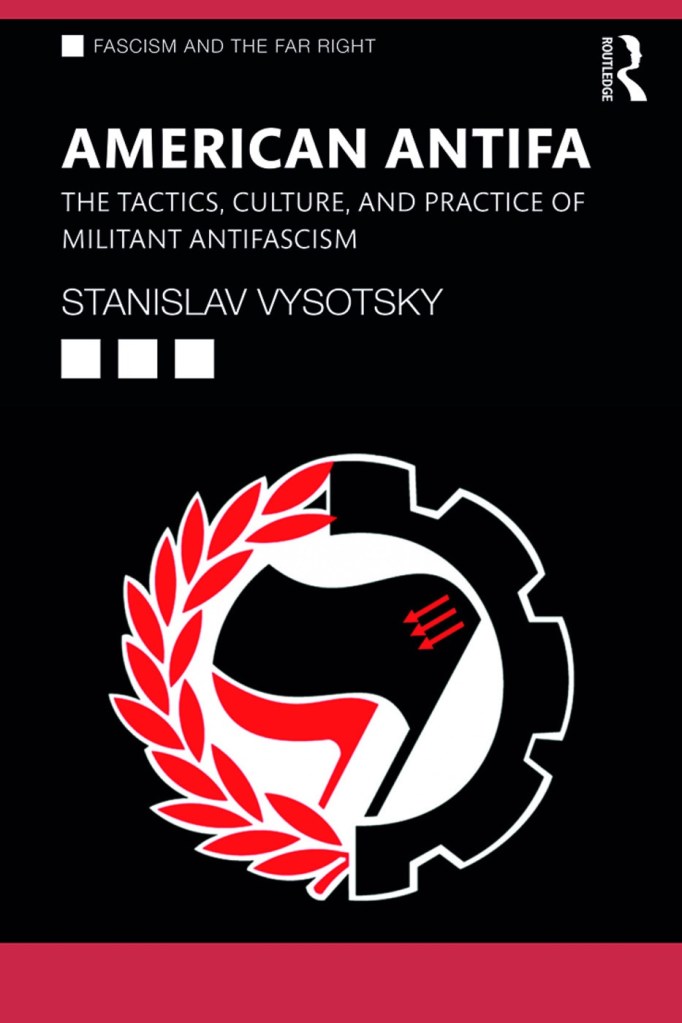
Stanislav Vysotsky, “American Antifa: The Tactics, Culture, and Practice of Militant Antifascism” (2021) – I figured I’d have a look at this new social scientific work on antifa in the US. I’m not sure what I expected but I was pleasantly surprised. It’s nice to see someone in the academic guild get something basically right about this fraught topic. The writing, predictably, plods, as social science does these days, with a lot of name checking and theoretical hedging. Vysotsky carefully classifies American antifa in relation to the literature on social movements, subcultures, etc. It’s also worth noting that Vysotsky did his primary research with antifa groups (“Old City” and “New City” Antifa) between 2007 and 2010, which is to say, years before antifa sprung into the news around the 2016 election. He has plenty to say about post-2016 antifa debates, but a lot of what he observed happened in the time when a few groups, mostly anarchists ensconced in punk scenes, were keeping the antifa thing alive.
The basic thing about antifa, Vysotsky argues, is that it is opposed to fascism. This sounds like a “duh” but given where the rhetoric around antifa has gone — and not just on the right, where it’s basically official that antifa is an underground army for communism/the Democratic Party — it is helpful to ground it some. Vysotsky describes antifa as a classic “countermovement.” The shape any given antifa group takes largely depends on its fascist opposition. Given that the research mostly took place before 2010, a lot of what this book looks at is groups dedicated to dealing with street fascists, generally open about who they are, often in and around punk scenes. This is pretty different from much of what I’ve worked on, where we deal with a range of fascists between Trump supporters and open Nazis, and are largely trying to keep their political movement from taking root in the area. But the general idea is accurate. Any antifa group that goes in already decided about what they want to look like and do, without a clear strategic purpose, won’t last long or do much good.
In any event, as Vysotsky makes clear, action other than violence — education, intelligence work, securing events, etc. — takes up more of any antifa group’s time than street fights, even for the most roughneck groups. This has certainly been true of local practice- I’m writing a book about this stuff and am worried I’ll bore audiences, there’s so little fighting. This is a nice marriage of practicality and ideology. Practically speaking, it makes sense to set some basic parameters, and within those parameters adapt your practices to the situation, when facing an enemy like fascism. Ideologically, anarchists kept the embers of the antifa flame going for a long time before it blossomed again post-Trump, and their emphasis on direct action, decentralization, and voluntarism has placed an indelible stamp on antifascism. Communist groups often participate to the extent they can hang with those values. As for us democratic socialists, well, let’s just say the decentralized decision-making structures in certain chapters of the largest democratic socialist organization stateside give us some leeway a “smaller tent” might now allow… There are times where the voluntaristic aspects of antifascist work can be frustrating, especially to the “frustrated officer” in every nerd boy. But it has answered, so far.
If anything, Vysotsky probably could have afforded to criticize antifa a little more in this book. They/we get stuff wrong. There’s infighting, posturing, ideological foolishness there the same as there is anywhere else on the left, or really in any kind of politics. Going into dangerous situations demands more organization and accountability than some organizations involved want to or can provide. But I think insofar as “American Antifa” exists as a corrective to conservative (both pop-journalistic and criminological) accounts, it is a valuable book. ****’
